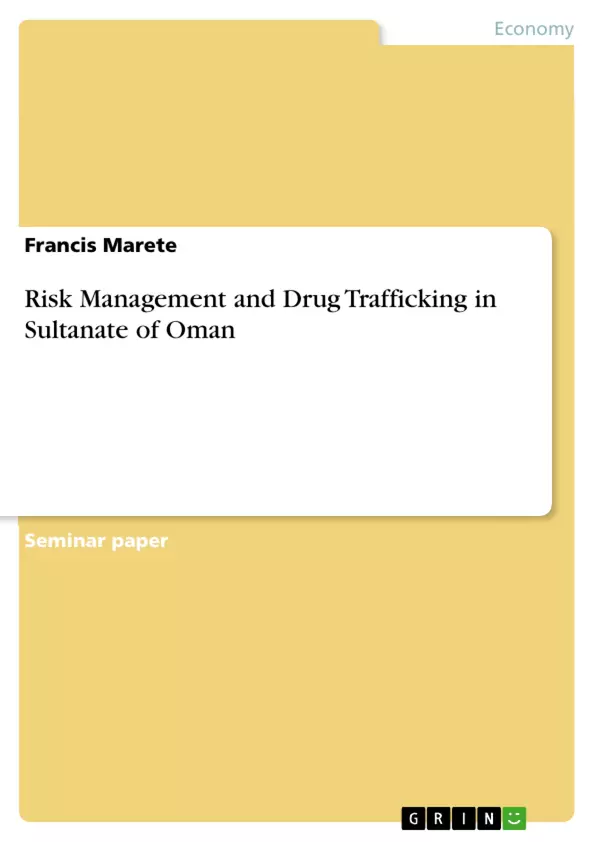Sultanate of Oman is a country dedicated to drug trafficking control. In connection to this, the country believes that drug trafficking is an international challenge to all the societies all over the world. Therefore, it cannot be controlled in one country rather requires a collective effort nationally and internationally. Sultanate of Oman has, therefore, subscribed to the international, federal anti-drug initiative that has two major elements, including, reducing the demand for the drugs, and reducing the supply of the drugs (Craft & Howlett 2012).
The biggest challenge in trying to control drug trafficking in the whole world is rising demand that is being experienced and locating the main drug traffickers, who at times are linked top officials of the government, since decisions has to be made on the best approach to be used (Nooraie 2008). This makes it even harder for the government to accomplish the primary goal of reducing the supply of illicit drugs flowing into the country. In its effort to hold the customs of the people in the country and trying to adhere to the human rights, the government of the Sultanate of Oman is unable to completely eliminate drug trafficking in the country. According to Focardi & Jonas (2008), the supporting goal that will ensure that drug trafficking is minimal is to reduce the amount of all the illicit drugs cultivated, consumed and processed in the worldwide.
Inhaltsverzeichnis (Table of Contents)
- Introduction
- Principles of Risk Management
- A risk ‘aware’ management culture
- Clear authority and responsibility
- Centralization of the risk control function
- Having a systematic and uniform continuous process
- Risk Management Framework
- Risk Management Program in Sultanate of Oman Security Agents
- Strength
- Creation of Value
- Increased Compliance with Law and Regulations
- Proper Use of Common Risk Control Framework
- Increased Transparency
- Effective Location of Primary Responsibility
- Weaknesses
- Limited Authority
- Limited Information Access by the Public
- Conflicting Roles and Responsibilities
- Impact of Controlling Drug Trafficking
Zielsetzung und Themenschwerpunkte (Objectives and Key Themes)
This document examines the risk management framework implemented by the Sultanate of Oman to combat drug trafficking. The primary objective is to analyze the effectiveness of the framework in achieving its goals, identifying both strengths and weaknesses in its implementation.
- Risk management strategies in drug trafficking control
- The effectiveness of law enforcement and security measures
- The impact of drug trafficking on social and economic welfare
- The role of international cooperation in combating drug trafficking
- The challenges and opportunities for improving the framework
Zusammenfassung der Kapitel (Chapter Summaries)
The introduction provides an overview of the Sultanate of Oman's commitment to drug trafficking control, highlighting the country's participation in international anti-drug initiatives. It discusses the challenges posed by rising drug demand and the need for a comprehensive approach to reduce both supply and demand.
The chapter on principles of risk management outlines key elements of a risk-aware culture, including clear authority and responsibility, centralized risk control, and systematic processes. It emphasizes the importance of creating a risk-conscious environment within the security forces.
The risk management framework chapter delves into the specific policies, regulations, and standards implemented by the Sultanate of Oman to combat drug trafficking. It discusses the role of administrative authorities in protecting social welfare and the importance of regulatory compliance.
The chapter on the risk management program in Sultanate of Oman security agents details the national laws and regulations governing drug trafficking control, including penalties for drug use and trafficking. It highlights the role of security agents and the use of mobile laboratories in detecting illicit drugs.
The strengths and weaknesses sections analyze the effectiveness of the risk management framework, identifying positive aspects such as increased compliance with laws and regulations, enhanced transparency, and effective location of primary responsibility. However, it also acknowledges weaknesses such as limited authority for security officers, limited information access for the public, and conflicting roles and responsibilities.
The final chapter on the impact of controlling drug trafficking examines the positive effects of the framework on reducing money laundering and improving social and economic welfare. It highlights the government's efforts in combating drug transmission and its positive impact on the lives of citizens.
Schlüsselwörter (Keywords)
The key themes and concepts explored in this document include drug trafficking, risk management, security, law enforcement, social welfare, economic impact, international cooperation, and regulatory compliance. Specific topics include the Sultanate of Oman's anti-drug initiatives, the effectiveness of the risk management framework, the challenges of drug control, and the impact of drug trafficking on the country.
Frequently Asked Questions
How does the Sultanate of Oman combat drug trafficking?
Oman follows a two-pronged international initiative: reducing the demand for drugs through social programs and reducing the supply through strict law enforcement and security measures.
What are the principles of Oman's risk management in security?
Key principles include fostering a risk-aware management culture, establishing clear authority and responsibility, centralizing risk control, and maintaining a systematic, uniform process.
What are the strengths of the drug control framework in Oman?
Strengths include increased transparency, better compliance with international laws, effective location of responsibility, and the creation of value through enhanced social welfare.
What challenges do security agents face in Oman regarding drug trafficking?
Challenges include limited authority for some officers, conflicting roles between agencies, and restricted public access to information which can hinder collective efforts.
How does drug trafficking impact Oman's economy?
Controlling drug trafficking helps reduce money laundering and prevents the drain on economic resources caused by drug-related crime and healthcare costs.
Why is international cooperation necessary for Oman?
Since drug trafficking is a global challenge, Oman believes it cannot be controlled by one country alone; it requires a collective effort to dismantle international supply chains.
- Arbeit zitieren
- Francis Marete (Autor:in), 2013, Risk Management and Drug Trafficking in Sultanate of Oman, München, GRIN Verlag, https://www.grin.com/document/279485



